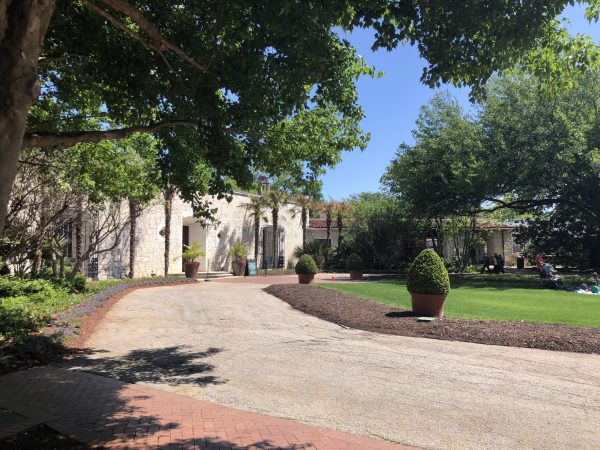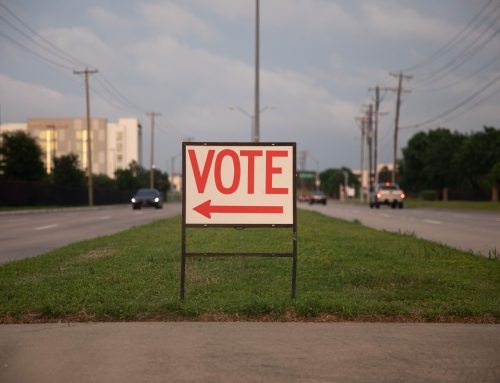
The Dallas Arboretum. Photo by Renee Umsted.
Editor’s note (Feb. 17): An earlier version of this story misidentified the person who sent a letter to Dallas Arboretum President and CEO Mary Brinegar. It was John Jenkins, the director of the Dallas Park and Recreation Department.
A former employee of the Dallas Arboretum has filed a discrimination charge against the botanic garden with the U.S. Equal Employment Opportunity Commission.
The former employee, who identifies as a genderqueer lesbian, published a Lambda Legal article using the name “Jay Doe” to describe her/their experiences while working at the Arboretum. In the filing, which was received by the EEOC on Nov. 19 and can be viewed here, Doe writes she/they use she/her and they/them pronouns.
Attorneys at the Lambda Legal Defense and Education Fund, Inc. are representing Doe.
“We have not received anything from the EEOC yet, but we also don’t comment on personnel matters,” a spokesperson for the Arboretum said in an email to The Advocate.
On Feb. 2, KERA published a letter from Dallas Park and Recreation Director John Jenkins written to Mary Brinegar, the Arboretum’s president and CEO, on Jan. 19. In it, Jenkins says, “The City of Dallas takes these matters seriously. Please refer to the non-discrimination obligations in the Dallas Arboretum’s agreement with the City, as well as all applicable city ordinances.”
Though Doe’s article was published Feb. 4, the Dallas Voice reported this story Jan. 14.
“My goal is to use my experience as a catalyst for the Arboretum to become more inclusive and accepting of its employees and of the backgrounds and identities of its visitors,” Doe writes in the article.
Doe was hired by the Arboretum in 2018, laid off along with several other employees when the pandemic began in March 2020 and was rehired in June 2020, this time as the public programs manager for the Rory Meyers Children’s Adventure Garden, according to the filing.
As a department manager, Doe writes in the article, inclusion, diversity, equity and accessibility were priorities in decision-making. When Doe suggested to the supervisor that the LGBTQ+ community should be represented in programming, the supervisor said “we could not promote or market queer representation.” In the EEOC filing, Doe is more specific and claims that the Arboretum approved of highlighting LGBTQ+ people in programming but not in marketing.
In the fall, Doe writes in the filing, she/they told human resources that working up to 55 hours weekly without time off was affecting her/their mental and physical disabilities. Doe also claims the performance reviews she/they received were positive.
Doe first started including pronouns in her/their email signature in fall 2020, and other Arboretum employees did the same, according to the filing. Employees later received an email notifying them email signatures had to be standardized, and pronouns should be removed. Doe obeyed.
Doe told the supervisor about her/their gender-fluid identity, Doe says. According to Doe’s article, the supervisor said she personally supported the LGBTQ+ community but the Arboretum “can’t force it on the public.”
After that, in an effort to create an inclusive environment, Doe supported Arboretum employees wearing pronoun pins, adding pronouns to email signatures and introducing themselves to others with their pronouns.
The Arboretum leadership soon banned those practices, Doe writes in the article.
“First, email signatures were ‘standardized,’ although the only change I noticed was the removal of pronouns,” Doe writes in the article. “Quotes, sayings and Bible verses remained. Then, pronoun pins and pronoun introductions were banned, and I was told that the Arboretum is a ‘conservative’ institution and employees couldn’t do anything that appeared to ‘support an agenda.’ A donor had recently seen an employee wearing a pronoun pin and called HR threatening to pull their support, and we needed to be careful about how we are viewed by our funders.”
According to the federal tax Form 990 for nonprofits, the Arboretum reported $11.99 million in contributions and grants during the reporting period ending Dec. 2019. That breaks down to $5.4 million in membership dues, $56,885 in fundraising events, $394,098 in government grants and $6.1 million in all other contributions, gifts, grants and similar amounts not included in those categories.
From 2015 to 2019, the Arboretum received nearly $70 million in gifts, grants, contributions and membership fees.
In the article, Doe describes a May 2021 meeting with a supervisor and the head of human resources and recalls telling them “these changes were like asking me to go back in the closet.”
The next work day, Doe was given a termination letter.
A month later, Doe had the opportunity to speak with Brinegar along with the chief operating officer and the director of human resources. They talked about the reasons for Doe’s termination and Doe’s belief that the reasons were pretextual or “were the result of disciplinary actions taken because of my sex, gender identity, gender expression and sexual orientation, my abilities and my affirmation of my co-workers’ LGBTQ+ identities,” according to the filing.
In November 2014, Dallas’ citizens voted to amend the city charter to prohibit discrimination on the basis of sexual orientation, gender identity and gender expression. Doe writes in the article that the charter amendment was passed before the alleged discrimination.
Doe had to seek additional medical and mental health care after the termination, according to the filing.
In the filing, Doe requested that the EEOC be the investigating agency and take “remedial action to enforce my rights, including but not limited to awarding compensatory and punitive damages.”
“No one should suffer the indignity of discrimination because of who they are,” Doe writes.





